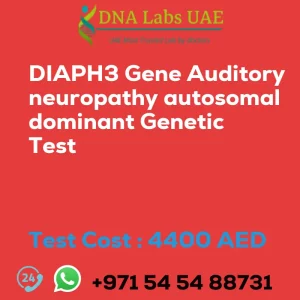PCDH15 Gene Deafness Autosomal Recessive Type 23 Genetic Test
Welcome to DNA Labs UAE, where we offer the PCDH15 Gene Deafness Autosomal Recessive Type 23 Genetic Test. This test is designed to identify any mutations or variations in the PCDH15 gene that may be causing deafness, specifically autosomal recessive type 23 (DFNB23).
Test Components and Price
The cost of the PCDH15 Gene Deafness Autosomal Recessive Type 23 Genetic Test is AED 4400.0. The test can be performed using blood or extracted DNA samples, or even just one drop of blood on an FTA card.
Report Delivery and Method
After the test is conducted, the report will be delivered within 3 to 4 weeks. The test utilizes NGS (Next-Generation Sequencing) technology, which allows for the sequencing of multiple genes simultaneously.
Test Type and Doctor
The PCDH15 Gene Deafness Autosomal Recessive Type 23 Genetic Test falls under the category of Ear Nose Throat Disorders. It is recommended to consult with an ENT doctor for this test.
Test Department and Pre Test Information
The PCDH15 Gene Deafness Autosomal Recessive Type 23 Genetic Test is conducted in the Genetics department. Prior to the test, it is important to provide the clinical history of the patient who is going for the PTPN23 Gene Ciliogenesis related disorder NGS Genetic DNA Test. Additionally, a genetic counseling session will be conducted to draw a pedigree chart of family members affected with the PTPN23 Gene Ciliogenesis related disorder NGS Genetic DNA Test gene PTPN29.
Test Details
The PCDH15 gene is associated with deafness, specifically autosomal recessive type 23 (DFNB23). This means that an individual must inherit two copies of the mutated gene (one from each parent) in order to develop the condition. The NGS genetic test involves sequencing the PCDH15 gene to identify any mutations or variations that may be causing the condition. This test can help diagnose individuals with DFNB23 and provide valuable information for genetic counseling and treatment options. It can also be used for carrier screening in individuals with a family history of DFNB23 to determine if they carry a mutated copy of the PCDH15 gene. It is important to consult with a healthcare professional or genetic counselor to discuss the specific implications and limitations of the test, as well as any potential treatment options or management strategies for individuals with PCDH15 gene deafness.
| Test Name | PCDH15 Gene Deafness autosomal recessive type 23 Genetic Test |
|---|---|
| Components | |
| Price | 4400.0 AED |
| Sample Condition | Blood or Extracted DNA or One drop Blood on FTA Card |
| Report Delivery | 3 to 4 Weeks |
| Method | NGS Technology |
| Test type | Ear Nose Throat Disorders |
| Doctor | ENT Doctor |
| Test Department: | Genetics |
| Pre Test Information | Clinical History of Patient who is going for PTPN23 Gene Ciliogenesis related disorder NGS Genetic DNA Test. A Genetic Counselling session to draw a pedigree chart of family members affected with PTPN23 Gene Ciliogenesis related disorder NGS Genetic DNA Test gene PTPN29 |
| Test Details |
The PCDH15 gene is associated with deafness, specifically autosomal recessive type 23 (DFNB23). Autosomal recessive inheritance means that an individual must inherit two copies of the mutated gene (one from each parent) in order to develop the condition. NGS (Next-Generation Sequencing) is a genetic testing method that allows for the sequencing of multiple genes simultaneously. In the context of PCDH15 gene deafness, an NGS genetic test would involve sequencing the PCDH15 gene to identify any mutations or variations that may be causing the condition. This type of genetic test can help diagnose individuals with DFNB23 and provide valuable information for genetic counseling and treatment options. It can also be used for carrier screening in individuals with a family history of DFNB23 to determine if they carry a mutated copy of the PCDH15 gene. It’s important to consult with a healthcare professional or genetic counselor to discuss the specific implications and limitations of the test, as well as any potential treatment options or management strategies for individuals with PCDH15 gene deafness. |







